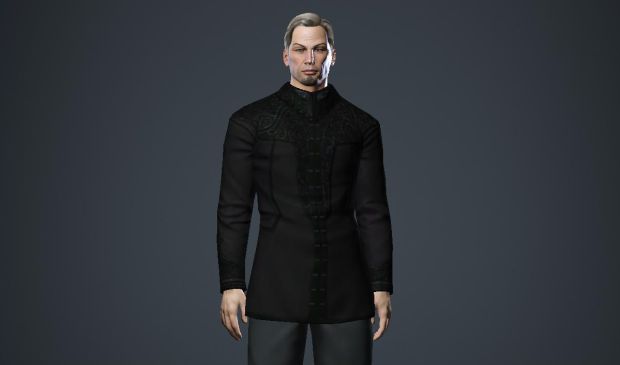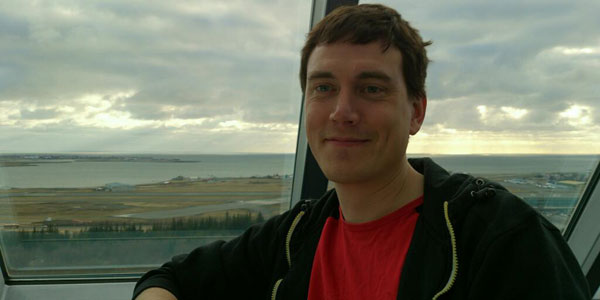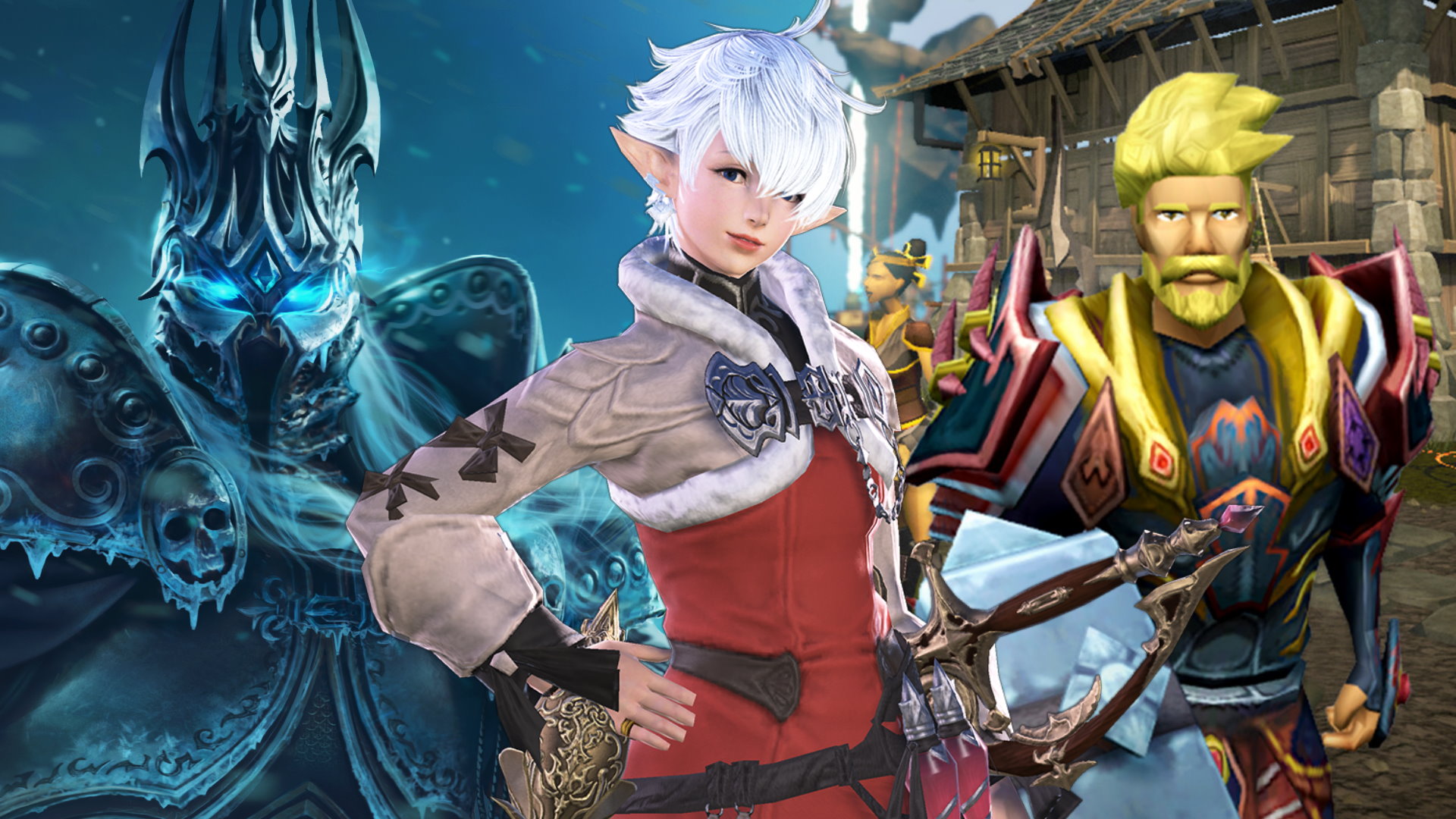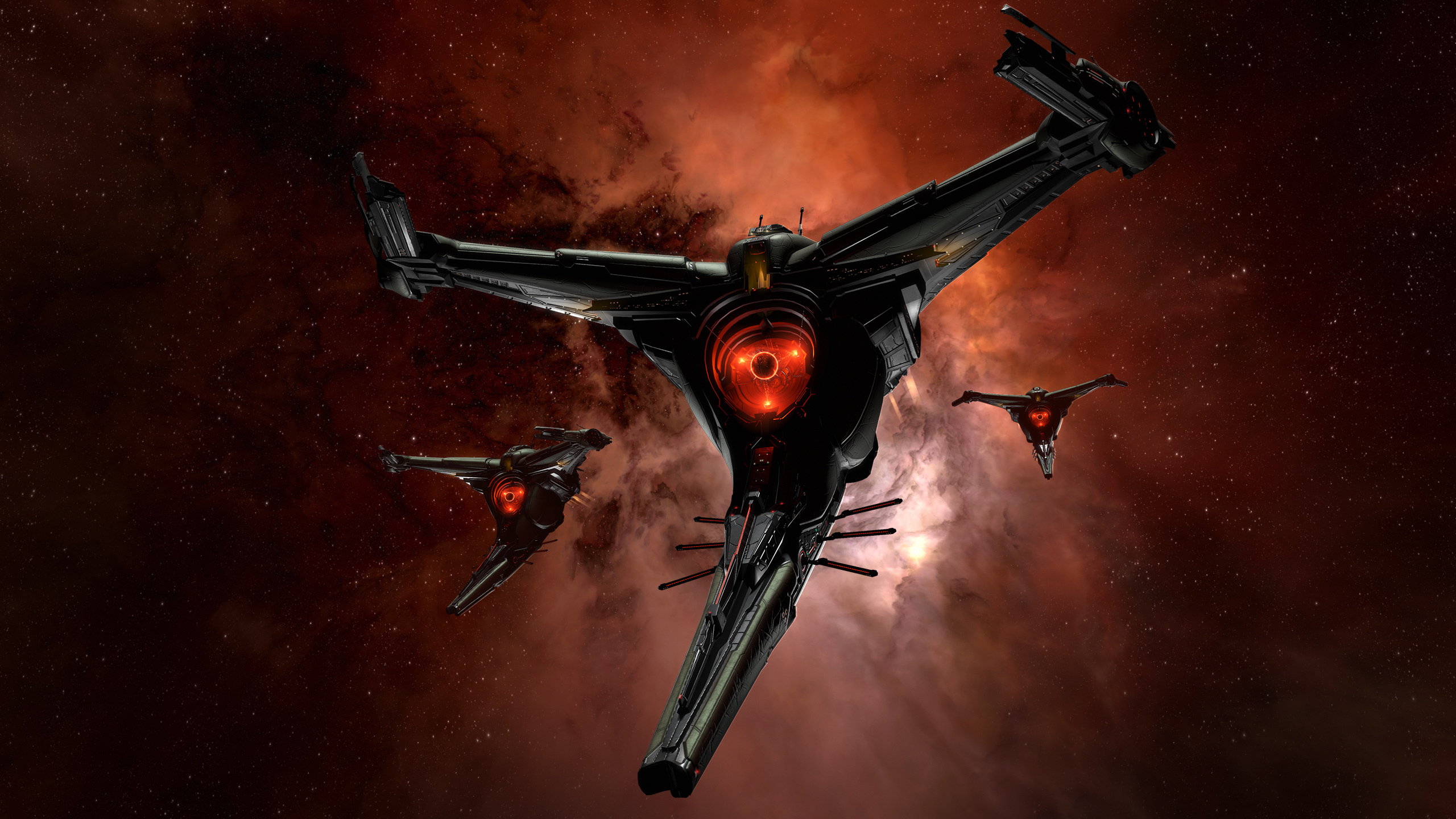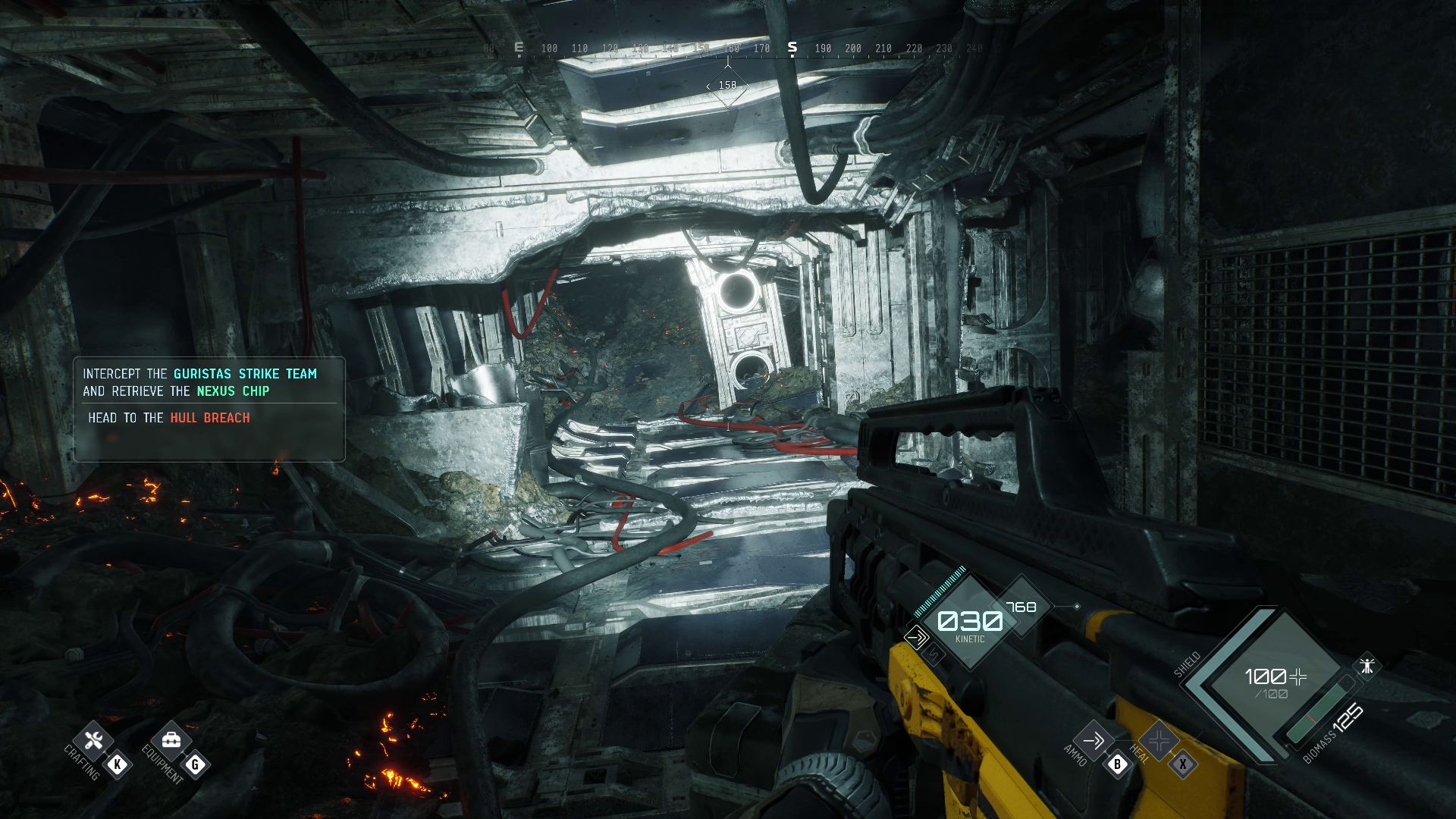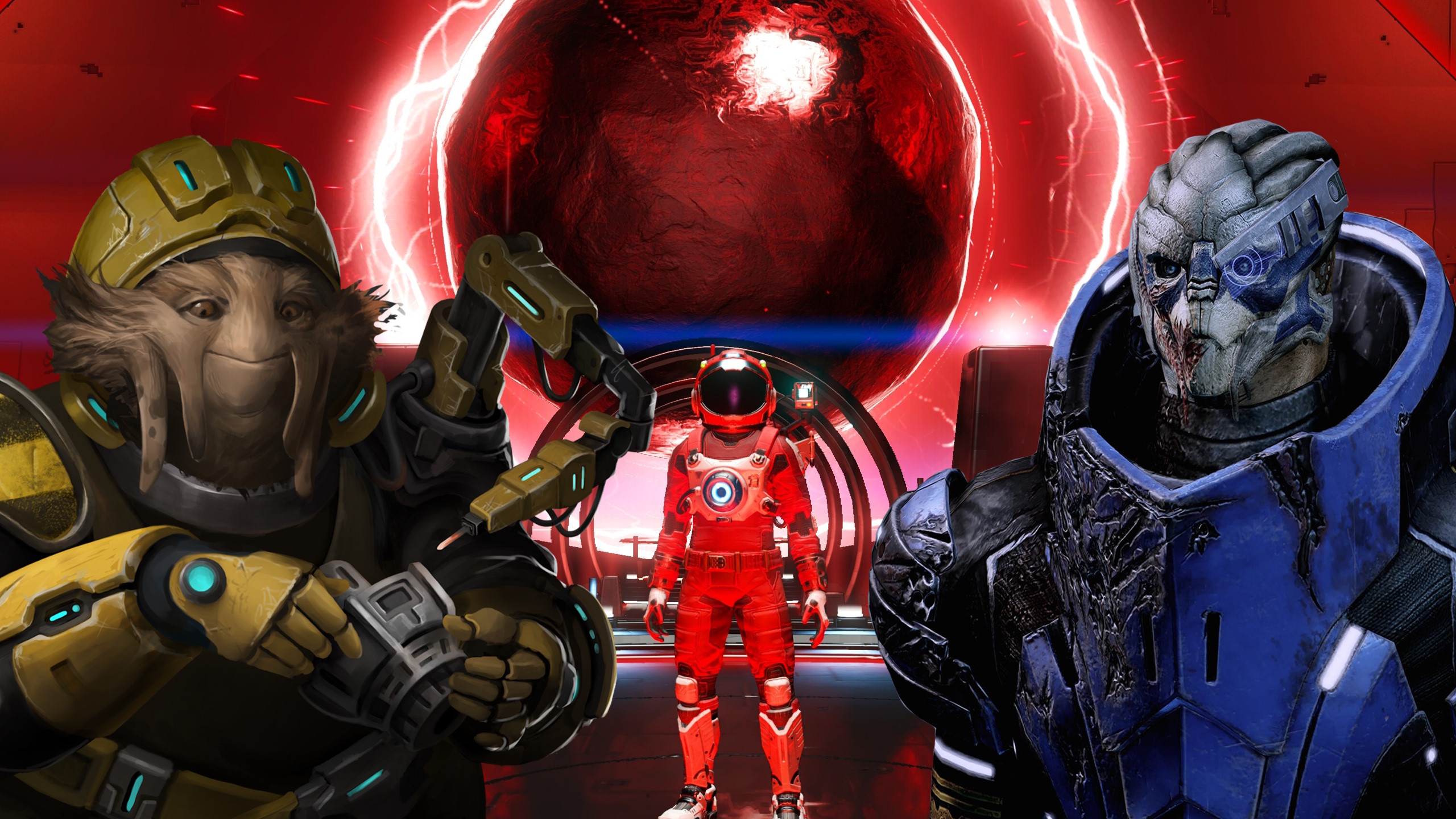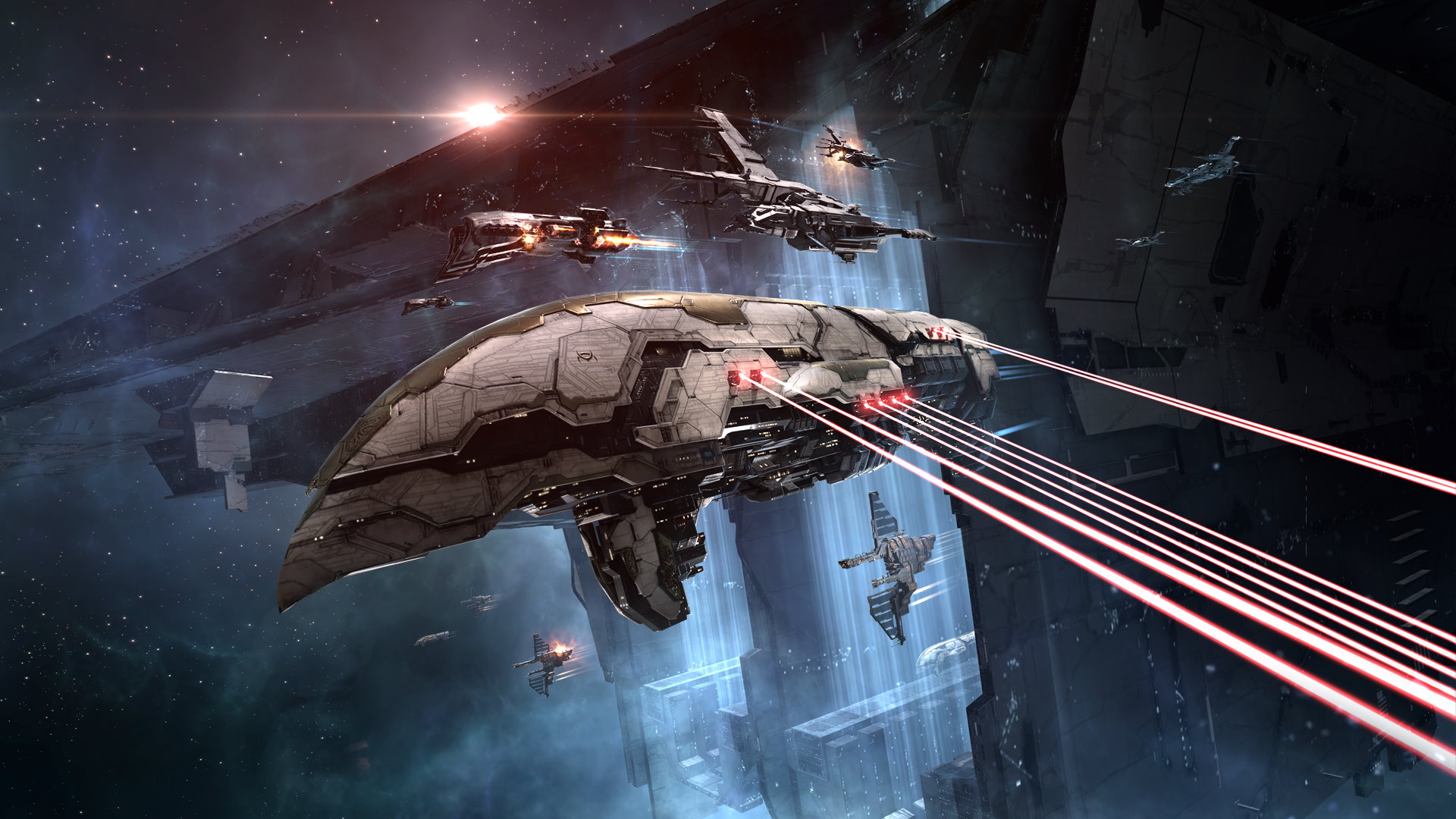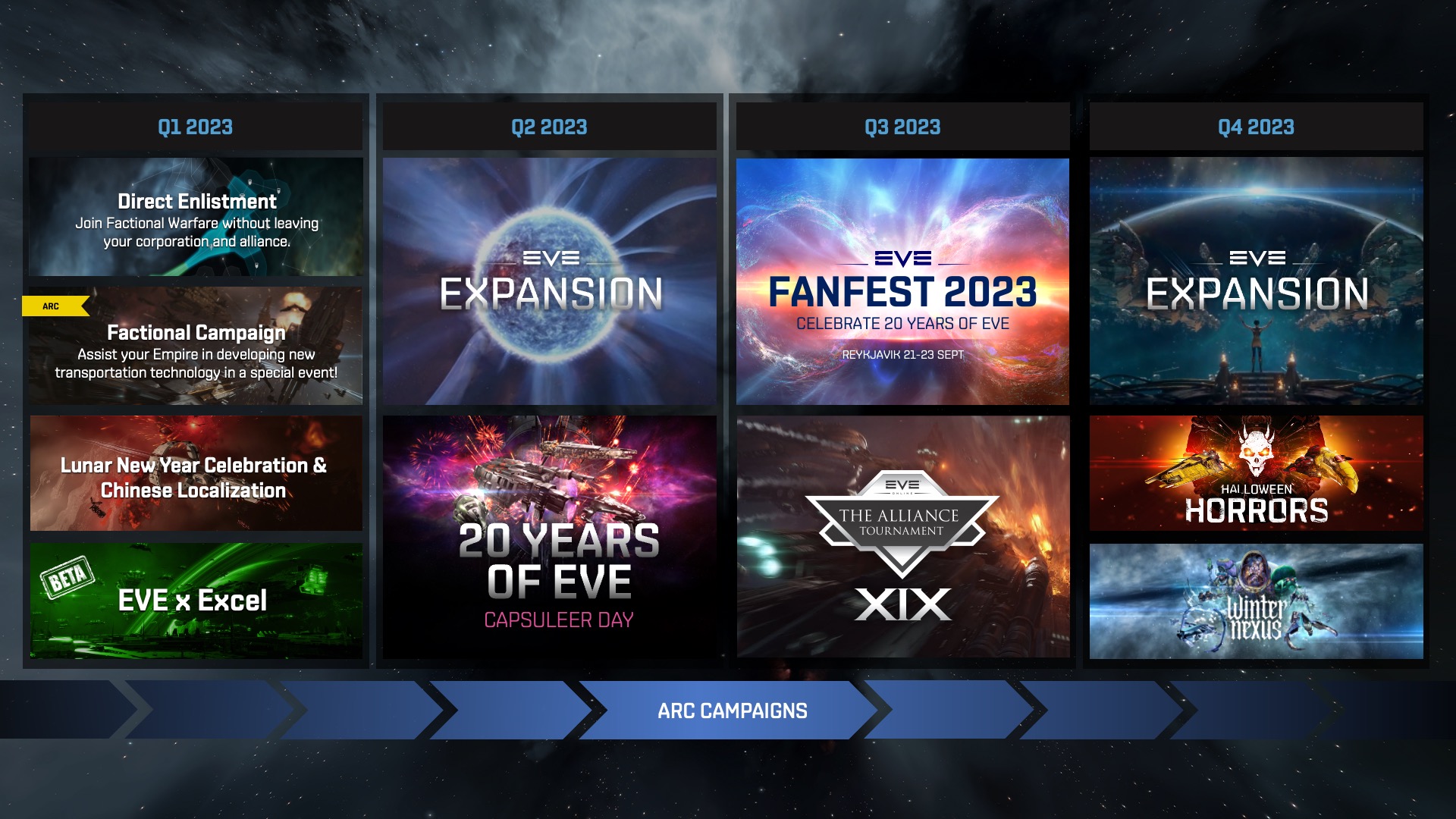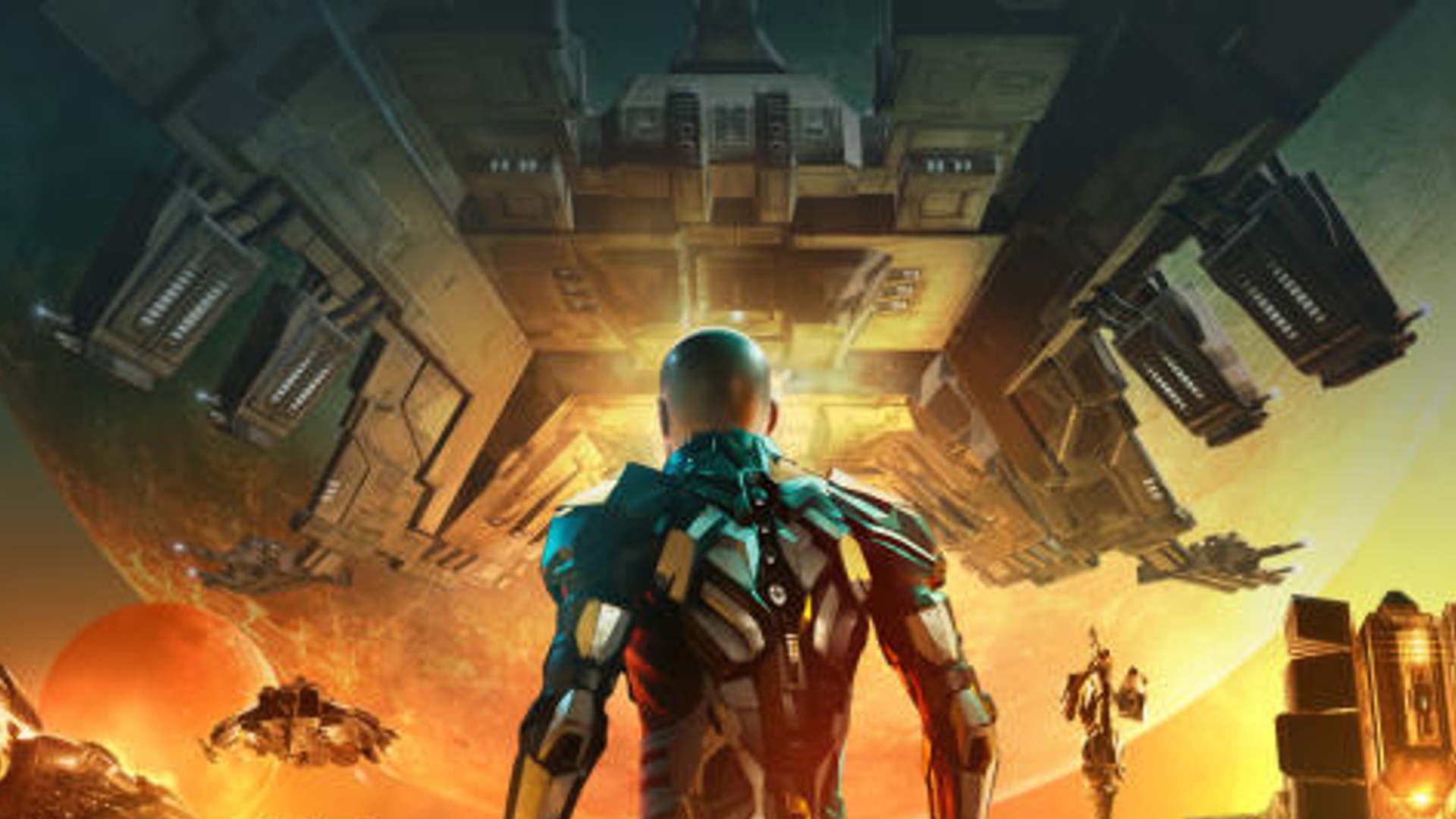Searching for the truth of a fake world at EVE Fanfest
Tourist in a virtual world
“When I’m here, [my real self] is at home. I’m my character. But right now, I’m not my character, because my character hates that guy's character. He fucked up my life in the game. But Alex [the person behind the character] is lovely, he’s always been good to me. So if I introduce you to him, don’t be a dick, because that’ll be on me then.”
I’m about to meet The Mittani. Or Alex. Maybe both. He’s a very small part of this story, but an important one.
“Do you play EVE?” He asks me, after establishing my credentials and showing a high-level of knowledge about RPS coverage of EVE in the past. When I admit that I don’t, he has an immediate response: “Then we have something in common. I don’t play EVE either.”
It’s the final day of Fanfest and even though I don’t have an EVE Online character, and whatever my reply to The Mittani might have been, I feel like I’ve been playing the game for a week now.
The Mittani
My unnamed acquaintance, the fellow who made the introductions in that first paragraph, was able to leave his real name at home. Like many EVE players, he’d come to Fanfest, a gathering of hundreds of players, devs and press in Iceland, to represent his in-game character. People wear the insignia of their corporations and alliances, and chant those same names at presentations and pubs. As a spectacle, it’s fascinating, but it’s also confusing.
If I leave my name at home, I don’t have another to replace it. And by taking part in the storytelling of EVE, I feel like I’m inadvertently choosing to play the game. By writing this, I’m choosing to play the game. Throughout Fanfest, whether I’m talking to famous in-game names or those who are just trying to get by, I can feel myself getting sucked into the roleplay of the situation. Case in point, this unplanned meeting with The Mittani; there’s something unnerving and distasteful about being warned off even as you’re introduced to somebody, but there’s also something exciting about the clumsy pageantry. I’m a serf being introduced to an emperor.
Except, no. Because this is Alex, not The Mittani. He’s off-duty, just looking to have drinks with his Imperium pals and whichever journalists want to tag along for the ride. But I’m not convinced there is such a thing as off-duty where EVE is involved.
I’d been telling people all week that if I played EVE, I’d want to be a documentarian, travelling from place to place and talking to people about their stories, large or small. Of course, that’s precisely what I spend Fanfest doing. The Mittani’s Imperium has a propaganda arm and it’s possible that anything I write will be filtered through that arm and repurposed or rebutted. If EVE is all about the spread of information and the control of information, whether that be economic, military or diplomatic, then a reporter might be playing the game by reporting on the game.
At least that’s how a mega-corp or alliance with a web of informants scattered across New Eden, EVE’s world, might see things. I’ll never have the influence to destroy a market or start a war by disseminating lies (or truths), but I can see the appeal. My journalistic alter-ego was more intended to be a receptacle for stories than a sinister Ministry of Misinformation though. I don’t have the desire to interfere with somebody else’s playstyle, and that makes me a poor candidate for EVE Online top-level play. “An eye for an eye” might make the whole world blind, but at least they’ll enjoy the ride. “Live and let live” doesn’t make for virtual lives worth living.
As I discovered over my time at Fanfest, two contradictory forces are at the heart of EVE’s player experience: trustworthiness and disruption.
Space Pope
I didn’t start the week feeling like I’d been accidentally embedded in the game. My approach was to learn by listening and observing, and one of the first people I observed was the Space Pope. Under his real name of Charles White he works at NASA, but in EVE he’s a religious leader in a fictional world.
He’s a common sight in the EVE Fanfest press area. Dressed in full religious regalia, he’s impossible to miss, and is often posing for photographs or taking part in video interviews. During the interviews, he’s often flanked by two nuns, one of whom I share a cigarette with on the balcony of the Harpa, which is the magnificent setting for this gathering of developers, fans and press. It a fitting location for space-talk, looking like a fragment of the future clinging to the bay, where impressive ships pass by on patrol, seeking resources and knowledge. Next door there’s a huge pit, an unfinished project, reminder that financial crises leave obvious traces in the real world as well as in EVE.
Out on the balcony, the wind is making a muddle of the nun’s wimple but she doesn’t seem to care, batting it back into place in a way that suggests she’s used to the elements trying to defeat her costumes. I’m not sure how an Amarr space nun is supposed to behave, and maybe smoking and swearing are essential parts of liturgical practice. Maybe this is someone who just happens to be dressed as a space nun rather than a member of the Papal contingency.
“Are you cosplaying or in-character?” I ask, half-joking.
“Am I what?” She asks, laughing and grabbing at her wimple again as it flickers above her head. “Who are you?”
This particular nun, I later discover, is an editor for The Mittani’s news site. We have something in common as well, but in the context of EVE I’m nobody. I have no horses in any of the races.
A common refrain throughout fanfest goes along the lines that EVE Online isn’t a game so much as a virtual world. I hear it from players, both major and minor, from the CEO of CCP, from community managers, producers, designers and presenters. Familiar as I’ve become with this insistence, Hilmar Pétursson, the CEO, takes the discussion of EVE’s nature to another level when I speak to him on the third day. He helps to contextualise my absence in the game by telling me that I might not be as present as I’ve always assumed in the real world either.
Hilmar: The CEO
“It’s a virtual world rather than a computer game. Of course, ‘computer games’ is an umbrella definition that covers an extremely wide-ranging number of things. There are aspects of it being a social economy. You can live out your life in that economy, but you also live out your life in a ‘real economy’ and neither is actually real. The economy isn’t actually real; it’s a statistical measure of human behaviour. I know that it’s not real from living in Iceland where it disappeared for a while and life continued.”
Throughout our conversation, Hilmar seems amused by his grand pronouncements about the unreality of things, but it’s rare for the laughter to travel farther than his eyes. He’s serious about this stuff, I think, just as he is when he talks about the possibility of CCP and other game and VR studios leading the way to new virtual futures and evolutions of the human form. He’s serious, or at least part-serious, but he knows how silly it all sounds.
"A fear of change is a very natural human response and I can sympathise absolutely with it, whether it’s valid or not. But this has been going on for thousands of years. Virtual reality...is nothing new; we’ve been moving from the physical to the abstract for a long time. From tradings things to trading money [an abstract representation of those things], to lawyers and finance, and jobs that don’t really operate in reality. Accounting is a fictional world, validating numbers for companies that don’t really exist. We think money is real but it isn’t.”
“The world is no more fake than EVE Online?” I suggest. The laughter spreads for a moment.
“These are all constructs of our minds and most of them rely on computers. I would argue that the move to a virtual world has already happened and a lot of jobs that people do exist as a figment of imagination.Think of the people roleplaying EVE Online downstairs. Are they working? They get paid to it. You get paid to come to Iceland and write about all of this. Is your job real?”
An actual audible laugh now, from me as well as Hilmar. I ask him about the people who play the game, and travel across the world to meet their alliance mates, and their enemies. He tells me to keep in mind that these are a small portion of EVE players. The majority are quietly making the world run, simply by living their lives and doing whatever job they have chosen. If the alliance leaders are the heart of the game, the majority of players are its lifeblood; without them, the heart doesn’t beat, and the game’s markets atrophy and die.
Meet the Players
But I’m here with the hardcore. During the course of Fanfest I met people who had been to the weddings of friends they first met in-game and there was an on-air proposal on EVE TV, a live broadcast running throughout the show. Two other players married in Iceland on the penultimate day of Fanfest. People line up to get EVE-styled haircuts and makeup, even tattoos.
What’s striking isn’t just the level of commitment - I’ve seen cosplay that looks like it required an engineering degree and a soldering iron at Gamescom before now - but the fact that so much of the decorative elements that people apply are about recreating a version of themselves. They’re aligning themselves with their own characters, corporations, empires and alliances rather than dressing as famous people in the ongoing history of the game.
That’s partly because anyone in-game can become a famous part of the fiction. Why dress as a bigshot somebody else created when you can become a bigshot yourself? Even if it’s true that most capsuleers will only ever be local legends at best, within their own circles they have stories to tell in which they are the heroes. Or at least the participants.
Many EVE stories aren’t about heroes or villains. The popular view of the game might involve great armies clashing by night, treachery and betrayal and trolling at a cosmic level, but keep in mind that every pilot in those battles is a player. There are fleet commanders and politicians pulling the strings, but some people show up, take part in the pew-pew, and then go back to a more-ordinary life away from the debris and the aftermath.
For many people EVE is a relatively quiet space where they can hang out with friends and get some work done. For every Skywalker that wants to leave the farm and join the Rebellion, there might be several who are happy to stay at home bullseyeing the occasional womp rat and keeping the family business running. Even if you are working down on the asteroid farm though, it’s probably good to know that great forces are plotting and preparing to go to war at all times. Calamity and/or glory can come swiftly and unexpectedly.
One of the joys of a world in which the player can be anything is that the player can also be nothing, in the grand scheme of things. And at this point in the game’s history, there are more player-run academies and newcomer-friendly alliances than ever before. I didn’t speak to a single person who saw the influx of new blood brought about by the much-improved new player experience as anything but a positive. Whether cynically seeing them as meat for the grinder, potential recruits or the vital actors in an ongoing space opera, everyone from mercenaries to marauders saw the value of fresh blood.
If nothing else, new players means a healthy CCP, which (hopefully) guarantees EVE Online’s continued existence and expansion. Nobody talks, without prompting, about the fact that their alternate world is a product made by a company that is concerned with profits. Speaking to CCP, and seeing them at work, they certainly seem to be a company aware and appreciative of the sheer wonder of creating a series of systems that have become a place where so many stories unfold, and so many people choose to spend so much of their time. But if the bills aren’t paid, the lights go out and the servers shut down.
Fresh Blood
Last year was a good year, financially, and the addition of a free-to-play component in EVE Online appears to have been a great success. Getting people into the game isn’t the hardest part though, it’s keeping them in the game. EVE Online is overwhelming and the new player experience attempts to mitigate that by guiding players through complex systems, including the player-driven economy in the form of a story.
CCP Ghost is the person holding the reigns of the new player experience. When I meet him, I go to shake his hand and fail miserably. That’s because, as I should have remembered, he recently broke both of his arms in a skiing accident. His wrists are still wrapped up tight.
The skiing accident forms a key part of his presentation during the EVE Online keynote. Ghost explains that his lack of experience had led his friends to book him a skiing lesson while they all swooshed off down a mountainside. Tired of waiting, he’d decided that he could figure things out as along the way, figuring that an understanding of the basic principles would at least carry him safely to the bottom of the slope.
That was not the case.
He compares that experience to playing EVE Online. The struggle there isn’t just to equip people with the knowledge and tools they need to survive, it’s to convince them to head down the mountain in the first place. Why should anyone bother when the whole place seems to be littered with hazards and the man who is standing here trying to convince us to give it a shot has two broken arms.
We need purpose, Ghost explains. Give us a reason to endure whatever lessons we must learn and whatever pain is inflicted along the way, and we’re much more likely to stick with EVE/skiing through the rough patches. There’s a parallel between the way he presents this information at the keynote and the way the new New Player Experience that he worked on has been constructed. Both use stories to lead listeners/players through complex lessons.
Ghost’s professional background, pre-CCP, was in fiscal crime, working for Iceland’s special prosecutor’s office. His work involved interrogating those implicated in wrongdoing and he was hired to overhaul the New Player Experience specifically because of his understanding of human behaviour. The game was secondary. In fact, I started to get the impression that the game is always secondary, or that the game is human behaviour.
I didn’t meet any new players at Fanfest. Presumably, not many (if any) make the trip to Iceland or Vegas, where another major fan gathering happens later in the year. Even if they are present, how attractive would they be to a journalist sniffing around for a story? My eye, and my dictaphone, were naturally drawn to the people gathering in groups with their corp insignia on display like a peacock’s tail. They form circles and exchange war stories, trying to sweat out last night’s hangover in defiance of the sub-zero temperature. Occasionally, as I speak to a group, other people will be attracted to the scene, wanting to share their tales as well.
There’s a general flow to most of these conversations. An initial wariness - “Who do you work for? What do you want to know?” - and then a few jokes, before the bragging begins. Many EVE players like to big themselves up, to the extent that it’s hard to tell how much of what they’re saying shouldn’t be taken with a pinch of salt, or the entire salt mine. During my brief conversation with The Mittani, as I felt he was figuring out where to file me as a potential ally or pain in the ass, I mentioned the difficulty of finding the truth in a game where everyone has their own version of the truth.
Telling the truth, he said, is the surest way to piss everybody off. There’s a reason his alliance have their own news network, rebuffing stories from elsewhere and spreading the good word. That’s why engaging with EVE reporting insinuates the reporter into the game. Propaganda and journalistic networks exist as an extension of the in-game world, so when I write about events and characters within that game, I can understand the argument that I’ve chosen to play rather than just to report from the outside. The exchange and control of information is an essential system for certain high-level players.
Trust
Some people told me about the trillions of ISK they’d gathered, or the structures they’d built and controlled, or the fleets they’d commanded, but the currency that people were most proud of was immeasurable: trust.
“It doesn’t matter if I’m going to fuck up your shit or make a fair deal with you. You have to trust that I’ll do what’s expected of me or everything falls apart.”
That was a pirate, whose name I didn’t catch because we were a few drinks deep in a bar at the time. I asked CCP Falcon, EVE’s Community Manager and a former pirate himself, to explain that attitude.
“I was a troll,” he says, which from the Community Manager for any other game would be very jarring indeed. Truth be told, dangerous though that might be, it’s a little jarring even in the context of EVE. Falcon spent years fucking people over as an in-game pirate, but the most interesting part of his story doesn’t involve one major heist or revelling in the pain of his victims; it’s the point when he discovered the importance of trust.
“We’d threaten people and they’d pay us protection money.” A classic racket, and one which the pirates honoured the terms of. “If you don’t stick to the rules, nobody takes you seriously.”
So when other pirate groups, or freelancers, started to offer similar terms of surrender and payment to people in the local area, Falcon and his friends paid close attention. When those pirates didn’t stick by the terms of the deals they struck, blowing people out of the sky even after the protection money had been paid, Falcon’s crew came down on them hard. Pirates killing pirates, to enforce a code of piratical conduct.
“It’s not that what they were doing was against the rules of the game. There are very few rules of that sort. It’s that they were making our role in the game much more difficult. If people didn’t trust us to carry through on our promises [and threats], then we wouldn’t be able to operate anymore.”
The Mercenary
Nobody I met was more proud of the level of trust they’d built among players than the Mercenary Coalition. I didn’t speak to their leader, Seleene, but the members I met were among the most visible players at Fanfest. They wear an insignia that wouldn’t look out of place in an eighties action movie - four playing cards with skulls at the centre of their suits - and they were always approachable, whether in groups or alone. That’s partly because they have nothing to hide, skimming across the surface of EVE’s conflicts and political disputes rather than being directly engaged in them, but it’s also because they’re genuinely eager to evangelise about the virtues of their way of life.
One merc told me, without any doubt in his voice, “this is the best way to play EVE, bar none. The contracts give you something to do and you can log in at any time, day or night, and there will be people online because we’re spread all over the timezones.”
I ask if a mercenary life is suitable for new players: “It’s the best life for new players. It used to be that EVE University was the only route in for someone wanting to get into the good stuff quickly, but we have our own academy now. We offer training for new players and even give them ships to use. Goonswarm made a step in the right direction way back just by letting anyone join up, and then Brave Newbies invented the concept of weaponised newbies, really giving new players something to get their teeth into.
Some people think there’s this attitude toward new players, that they can be an inconvenience and that they’re not welcome, but I can’t remember that ever being the case. Even the people who troll newbies are really trying to involve them in the game rather than push them out of it. We take the approach of involving players in contracts and we see them as valuable new resources. We want more people because that allows us to grow and to take on bigger jobs, or more jobs.”
Mercenary work, it turns out, takes many forms. On rare occasions, the Coalition will work on retainer. Once they were hired to protect a large structure that was under construction while its owner was - in real life - working away from home and couldn’t keep an eye on it. The strength of the merc life is the flexibility it offers though.
“We can reject losing fights. You can’t do that if you’re defending your own territory or committing your own fleet to a war that you absolutely have to win. We know our limits and to maintain trust and a reputation, we know it’s valuable to stay within those limits. If we fail on a contract, that’s damaging. Our reputation is strong enough to survive a couple of hits, but we don’t want to burn bridges.
There’s a moral compass as well. We won’t always go with the highest bidder if we think the consequences of helping one alliance or another might be detrimental to our interests further down the line. But there’s never bad blood. People understand that it’s business and we can take a contract to work against somebody and then be hired by them a month down the line. The good thing about being a mercenary is that people don’t hold grudges.”
If the arrival of new players has been a blessing for the mercs, it’s another of CCP’s changes that has brought the greatest improvement to their lifestyle and career of choice.
“The Citadels expansion was such a happy accident. It’s the key to how we operate. These are high value structures that people need to defend and we’re the perfect candidates for that job.”
Steve Ronuken, a member of the Council of Stellar Management (the democratically elected group that provides a bridge between players and devs), told me that the most important lesson anyone could learn when they first picked up EVE was “not to fly what you can’t afford to lose”:
“You might not be able to replace [what you’re flying] immediately but you should be able to build back up from a loss rather than feeling you’re completely ruined. People need to figure out not to put all their eggs in one basket and we need to help them to figure that out.”
Citadels are big baskets containing lots of eggs, as were Titans and Supercarriers before them. It’s possible to operate at a level where even the most expensive in-game structures and ships can be bought with your equivalent of pocket change, but right now you can count the most valuable structures in-game on one hand. Nobody takes them for granted and losing them is going to hurt even the most jaded and battle-scarred alliance leader.
For the Mercenary Coalition, that’s a beautiful thing. The bigger the basket, the more golden eggs it can carry, the more in demand they are likely to be. And that makes them happy.
The Broker
Other players have found their role in the game shrinking though.
In EVE, it seems like most people just want to watch the world burn, but plenty want to help it turn, and maybe even put out some of the fires. Chribba, a broker facilitating major transactions between the often duplicitous residents of New Eden, is the rare player who built a reputation based entirely on fair play and honest dealings rather than disruption and violence.
He describes himself as “retired” when we meet, later explaining that he didn’t choose to end his career, but rather was made obsolete by the changing landscape of EVE. For years, though, he was a major player in a universe whose most well-known inhabitants are much more likely to be associated with war, piracy and griefing (verb: causing grief to others for kicks) than for honesty and enabling happy exchanges.
As with the mercs and Citadels, Chribba found a boost to his in-game career when the game changed to accommodate his work. Essentially, that work involves being a trusted third-party, holding onto the goods and cash two other parties wish to exchange, and making sure that both parties leave with what had been agreed upon. If trust is the most valuable commodity in EVE, there’s no greater example of that than Chribba, a man who made several fortunes on the back of his reputation as an honest broker.
Along the way, he learned some tricks of the trade - always choose your own safe zone for exchanges to avoid ambushes and trickery, being the prime lesson - but no exchange would have been possible if people hadn’t known that they could trust the broker to begin with. He describes the times a deal has gone sour, ships warping in and capturing the vessel their colleague just sold, even while the purchaser is still on board. Commonly, they’ll then have the pilot pay a ransom or destroy both pilot and ship, or sometimes take the ransom and blow everything to pieces anyway.
These are elaborate schemes. If you’re buying your first Titan, chances are you haven’t flown one before and the seller might bank on that anxiety and ignorance, exploiting it for their own ends. In one trade, the capacitor had been drained before the hand-over, meaning the new pilot had no way to leave with his new toy once the cash had changed hands. At that point, the broker’s job is done, but Chribba says he always paid back his fee if things went south, even if he wasn’t to blame.
That’s all part of maintaining a reputation. In EVE, people will do terrible things and not all of them can be prevented, but trying to smooth over the damage at least shows some commitment to bandaging the wounds.
What amaze me more than anything is how vividly Chribba describes the sense of responsibility he feels, not during the handover itself, but in his role as a facilitator for these extraordinary purchases.
“People buying their first Titan are nervous. lt’s a huge investment and a big moment for them. I always wanted it to go as well as possible and that involves seeing how they react as we move toward the deal, and trying to understand how they deal with the situation. I would walk them through the whole process beforehand, keeping in mind that maybe they don’t know how to use the ship at all once they’ve bought it. Sometimes people are so nervous that they can’t even click the board button.”
The heists and the kidnappings and the wars suddenly feel like so much background noise to the wonderfully weird sight of a player leading another through a dress rehearsal for the biggest exchange of their lifetime. No laserfire scorching a thousand ships, no Citadels crumbling against the backdrop of a furious sun - just a person on a car lot, all their savings about to be blown, hoping that the worst doesn’t happen.
I’ve been there. Most of us have, whether it was a car lot, a letting agency, a university, a hospital, a bank, or any one of a thousand other places where we take a gamble on our future. Chribba might be taking a fee for his services, but he does have a genuine sense of care for his clients.
Now that the game’s systems have changed to the degree that he’s no longer required, I asked if he had considered going out in a blaze of inglorious betrayal. Banking all of that reputation on the biggest job possible and then blowing it all to hell.
“Of course I’ve been approached by people who want to use me in that way, but I’ve never really been tempted. I want to make things run smoothly. Playing solo, as I do, there is nothing to gain from creating large-scale disruption.
“There’s nothing I can steal that I haven’t already earned being legit. But people do approach and try to explain how we could pull off some great heists using my name. I’m not interested because it’s a personal achievement to be a good person in EVE. Within the sandbox, I can understand why people burn every bridge either to keep things interesting or for their own gains, but being the good person is a unique achievement.”
There’s nothing sanctimonious about Chribba though. When he recalls the first time one of his deals went bad, he also recalls who was responsible.
“The Guiding Hand Social Club. I have such a huge amount of respect for them.”
Even the nicest man in EVE tips his hat to the space-bastards.
The Necessity of Disruption
EVE needs its villains. Whether they’re inflicting random acts of unkindness or plotting for months or years to create the sort of epic stories that form most non-players’ understanding of how the game works, the trolls and the bastards and the plotters and the pirates keep the world ticking over. Chribba’s thousands of deals helped to keep the ecosystem running as well, unclogging the arteries of the economy and ensuring that large-scale exchanges can take place, but for most people EVE isn’t about constructing the most efficient and stable space it’s possible to construct. It’s about creating stories.
CCP Falcon, the Community Manager, says that EVE isn’t a petri dish of bad behaviour, but of emergent behaviour:
“A big chunk of EVE’s design is based around disruptive gameplay. We take the rules that we do have very seriously, but it’s very rare that we actually intervene. In 2008 or 2009,we had an 800 billion Ponzi scheme. This guy ran a bank for like a year and then he closed the bank and took the money and vanished. Some people got screwed and accepted it and moved on.
Some people said “CCP, what are you going to do about this?” And we said “nothing.” Every day is a school day. That’s just kind of the way we manage things.”
That’s where I see the contradiction between a virtual world for everyone and the reality of EVE. The reality is that for all the conversations I have about what a welcoming place it can be, for every academy for newcomers and the genuinely loving vibe that Fanfest creates, there’s an admission between all of it: “Thick skins required”.
Jin’taan, a legendary Fleet Commander and member of the Council of Stellar Management, takes responsibility for the virtual lives of thousands. Playing at that level doesn’t mean he’s become apathetic to loss though:
You’re not just losing your own stuff you’re losing your friends’ stuff. I’ve had stress dreams about losing fights. I’ve cried over it. I’ve done research into it and most Fleet Commanders are sociopaths.”
If he knows the pain of losing, does he feel guilt when he annihilates an enemy fleet?
“No.” He smiles. “I feel bad when I lose my things but not when other people use their things.”
Tragedy is when I stub my toe, comedy is when your entire fleet disintegrates on a livestream.
By the final day, I knew I was going to miss EVE, even though I prefer games and the people who play them to treat me a little more delicately than this one might. It's a fascinating, extraordinary experiment in player-led systemic design. I joked with several members of CCP that the players have become their code. Most of them nodded, without acknowledging any implied humour in the statement.
When I left Iceland, I felt dislocated from the weird bubble of intensity that surrounds the game. Cruel as it can be, it's a world that people care about deeply. I still plan to report from the inside and, for that purpose, I now have an in-game name so that I can leave my own name at home if I visit Fanfest next year. Except in the pub; I don't have the strength of character to keep up a roleplay in the pub.
And Fanfest takes place in pubs as well as presentation halls. There's an annual Fanfest Pub Crawl that mixes players, devs and press into groups, and unleashes them on the streets of Reykjavík. During mine, separated from the group I'd been attached to, I met a player who I hadn't spoken to before. He'd travelled from the States and this was his first Fanfest. He'd had, he said, "the best time of my life". When I told him I was a journalist, he asked if I'd met any famous players and it turned out he idolised Chribba.
“He’s here? Oh wow. I had no idea. I’d love to meet him.”
We talked for a while, as ourselves. I was Adam he was...I forget. I'm sure he has as well. Eventually the conversation came back to Chribba and he got excited about something as a memory came bubbling to the surface.
“Have you seen this?”
On his phone, an advert on a forum for a trade. Somebody was offering to sell Chribba’s frozen corpse for a tidy sum of ISK. Imagine being so well-known that people are willing to buy your virtual corpse, presumably as a trophy?
I ask my new drinking buddy if he knows who bought the corpse and what became of it.
“Nah. Nobody. Nobody bought it. It was a scam. It was all fake.”
After four days back in reality, that's starting to sound like the smartest thing I heard all week. Whether it's The Mittani stirring the pots and ensuring that his shadow is at least as long as his reach, or Chribba feeling left behind by a world where he was once a kindly catalyst, EVE seems more like an elaborate series of performances than a game. I can't get at the numbers without being on the inside - the billions and trillions that people throw around in conversation are as fake as Chribba's fake corpse. Even if the figures are real, fluctuations in the economy dent or exaggerate them from one minute to the next.
Steve Ronuken tells me that EVE is one of the few games that can teach an appreciation for real loss: "People who get frustrated aren’t going to last very long. If you don’t get used to losing stuff and accepting it then you won’t last very long. That doesn't mean you have to enjoy losing things or having them taken from you, but it means you're learning to cope with it."
Xenuria, a player whose name was defaced from the real-world EVE monument three years ago, has a much more peaceful relationship with the game than in the past. He explains that it has helped him to develop social skills that he's found it difficult to master in the real world. He tells me that he's "on the spectrum" and that his approach to human behaviour fits with EVE perfectly. In both worlds, he sees social interaction as something more akin to a game system than a natural set of responses.
"EVE is a microcosm," he says, while in conversation with a few journalists and members of the Council of Stellar Management. "It's more than just a game it’s also my own personal petri dish where I can try out things that might not be appropriate in the real world."
Ronuken responds: "It might not be able to improve the world; but it can improve the people who play it. EVE gives people a chance to experiment socially in a structured environment and you can always walk away from it. That's fine. From that perspective it’s a great place to try new things and to learn about yourself. It’s a world in miniature."
As is Fanfest, where I've learned that I might not have the patience or the thick-skin to survive my first few weeks in New Eden, but I'll be damned if I'm going to give all of this up without giving it my best shot. It's slopes might be littered with the broken forms of players without the right skills or sense of purpose, but whether it's fake, real or somewhere in between, New Eden is waiting, and I want to see what stories it still has left to tell.

